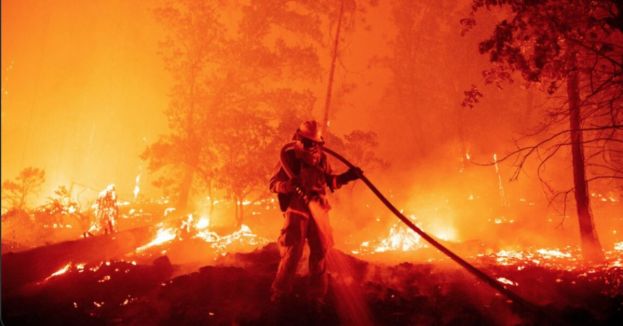Now, new Canadian research shows that these fires may also increase lung and brain cancer risk.
People who lived within a 30-mile radius of wildfires over the previous 10 years were 10% more likely to develop brain cancer and had a 5% higher risk for lung cancer compared to folks living further away from these fires.
"We saw a consistent signal for lung and brain cancer risk among people who live near wildfires," declared study author Scott Weichenthal. He's an associate professor in the Department of Epidemiology, Biostatistics, and Occupational Health at McGill University in Montreal. "We know that a whole range of carcinogens is released during wildfires that may increase the risk for these cancers."
WATCH: 1940'S FOOTAGE OF THE TALLEST MAN TO EVER LIVE![]()
Wildfires commonly begin in forests, grassland, or prairies and are often caused by campfires left isolated, still-lit discarded cigarette butts, sparks from power lines, or arson. The study authors reported that these fires tend to transpire in similar parts of the country, so people living in these areas can be constantly exposed to the potentially cancer-causing wildfire pollutants.
BRIDGING THE GAP: ONE PROGRAM'S MISSION TO CONNECT YOUTH ACROSS AMERICA'S RED AND BLUE DIVIDE![]()
Making matters worse, "wildfires are occurring more frequently, covering larger parts of the country, and wildfire season is starting earlier," Weichenthal declared. These changes are likely due to global warming and climate change, he acknowledges.
WATCH: THIS IS A TEACHER! LISTEN TO HIM ADVOCATE FOR MORE RACISM![]()
For the study, Weichenthal and his colleagues (including Ph.D. student Jill Korsiak, who led the analysis), tracked 20 years of data on more than 2 million Canadians to understand more about how wildfires impact people's risk for certain cancers.
TURKISH PRESIDENT'S DANGEROUS GAME: HOW HIS SUPPORT FOR HAMAS IS TESTING NATO'S LIMITS![]()
The study wasn't designed to look at specific toxins in smoke that may increase cancer risks. "There's still a lot to learn about the kind of pollution that sticks around after the fire," Weichenthal stated. It's not just about outdoor air pollution: "Wildfires also pollute water, soil, and indoor air," he explained.
ISRAELI MILITARY INTELLIGENCE CHIEF STEPS DOWN FOLLOWING MAJOR OCTOBER 7 FAILURE![]()
Dr. Mary Prunicki, who reanalyzed the new study, emphasized that "we know more about the short-term effects of wildfires than we do about their long-term impact." She directs air pollution and health research at the Sean N. Parker Center for Allergy Research at Stanford University School of Medicine in California.
FAITH, KNOWLEDGE, AND EXCELLENCE: CATHOLIC HIGHER EDUCATION STEPPING IT UP AMID WOKE CULTURE![]()
On the day of and days directly following a wildfire, there's an uptick in hospital visits for asthma attacks, chronic obstructive pulmonary illness (COPD) exacerbations, and other lung conditions, Prunicki stated.
IS TUCKER LOSING IT? MANY THINK HIS TAKE ON UFOS IS A BIT CRAY-CRAY![]()
"There is a strong literature showing an increase in heart attacks, cardiac arrests, and strokes among people who have been exposed to wildfire smoke, especially those who have a preexisting condition," she clarified.
Anyone living near wildfire smoke may have burning eyes, a runny nose, cough, and/or problem breathing.
CAUGHT ON CAMERA: MICHIGAN GRANDMA ALLEGEDLY ORCHESTRATES SCHOOLYARD ATTACK![]()
Exactly what's in the smoke relies on what is burning, Prunicki expressed, but "in general, wildfires contain small particulate matter that can penetrate deep into the lungs and cause health problems.
"There are various toxins that could be in the smoke that has already been associated independently with increases in lung cancer, including polycyclic aromatic hydrocarbons [PAHs]," she additionally stated.
HILLARY'S HILARIOUS REVELATION: HER TAKE ON TRUMP'S 'BROMANCE' WITH PUTIN![]()
There are actions you can take to protect your health if you live in a part of the country where wildfires are common. According to Prunicki, these include apprehending your indoor air quality, and if it's poor, using an air purifier or a high-efficiency particulate air (HEPA) filter in your central air conditioning or heating unit. These filters can help vacate pollutants from the air you breathe. Also, "if you have underlying heart or lung conditions, make sure you have your medication at the ready, too," Prunicki stated.
TRAGIC TURN: FORMER PHILADELPHIA COP MAKES SHOCKING CONFESSION![]()
It's important as well to decrease the risk of wildfires when you're enjoying the great outdoors, including dousing your campfire with water until it's cold to make sure it is out.
The new study was published in the May 2022 issue of The Lancet Planetary Health.








 Discover alternative ideas that will make you think
Discover alternative ideas that will make you think Engage in mind bending debate
Engage in mind bending debate Earn points, rise in rank, have fun
Earn points, rise in rank, have fun


